On November 8-9, something remarkable happened in Joplin, Missouri. Over 120 people applied—many of whom had never written a line of code—to gather at Missouri Southern State University to help solve real healthcare problems. By Sunday afternoon, they'd built 31 working AI-powered solutions. The winner? Tenise Wertman, a self-taught AI coding novice and mother of nine from Verona, Missouri, who created a scheduling system that could save Joplin healthcare providers thousands in lost revenue from no-shows.
This wasn't a thought experiment. It was Missouri's first Vibeathon—an AI vibe-coding hackathon competition where the barriers to building software collapsed, and people with context beat people with credentials.
What Happened in Joplin
The weekend started with a simple premise: give Missourians the tools to build solutions for problems they actually understand, then get out of the way. Participants worked alongside Codefi's vibe-coding coaches and local healthcare professionals to tackle three critical challenges identified through our partnership with the Joplin Regional Alliance for Health and Health Sciences (JRAH):
Frictionless Scheduling – Streamlining appointment booking and reducing no-shows that cost local providers thousands annually.
Financial Navigation – Making healthcare costs transparent so patients stop avoiding care because they can't predict the bill.
Referral & Care Navigation – Coordinating patient journeys across multiple providers, a challenge that hits rural communities especially hard.
These weren't abstract prompts dreamed up in a conference room. They came from structured discovery done as a result of a joint partnership between JRAH and codefi—the same process driving our new HealthTech AI Software Startup Studio. Healthcare administrators, providers, and staff told us what actually breaks in their daily workflows. Then we handed those problems to builders and asked them to code a solution using the latest AI coding tools.
By Sunday, 31 solutions had been submitted. Teams demoed live to community judges and an AI-assisted evaluation system that scored solutions on problem clarity, working functionality, responsible data handling, and a credible path to real users. $20,000 in prize money was awarded across the three challenge areas.
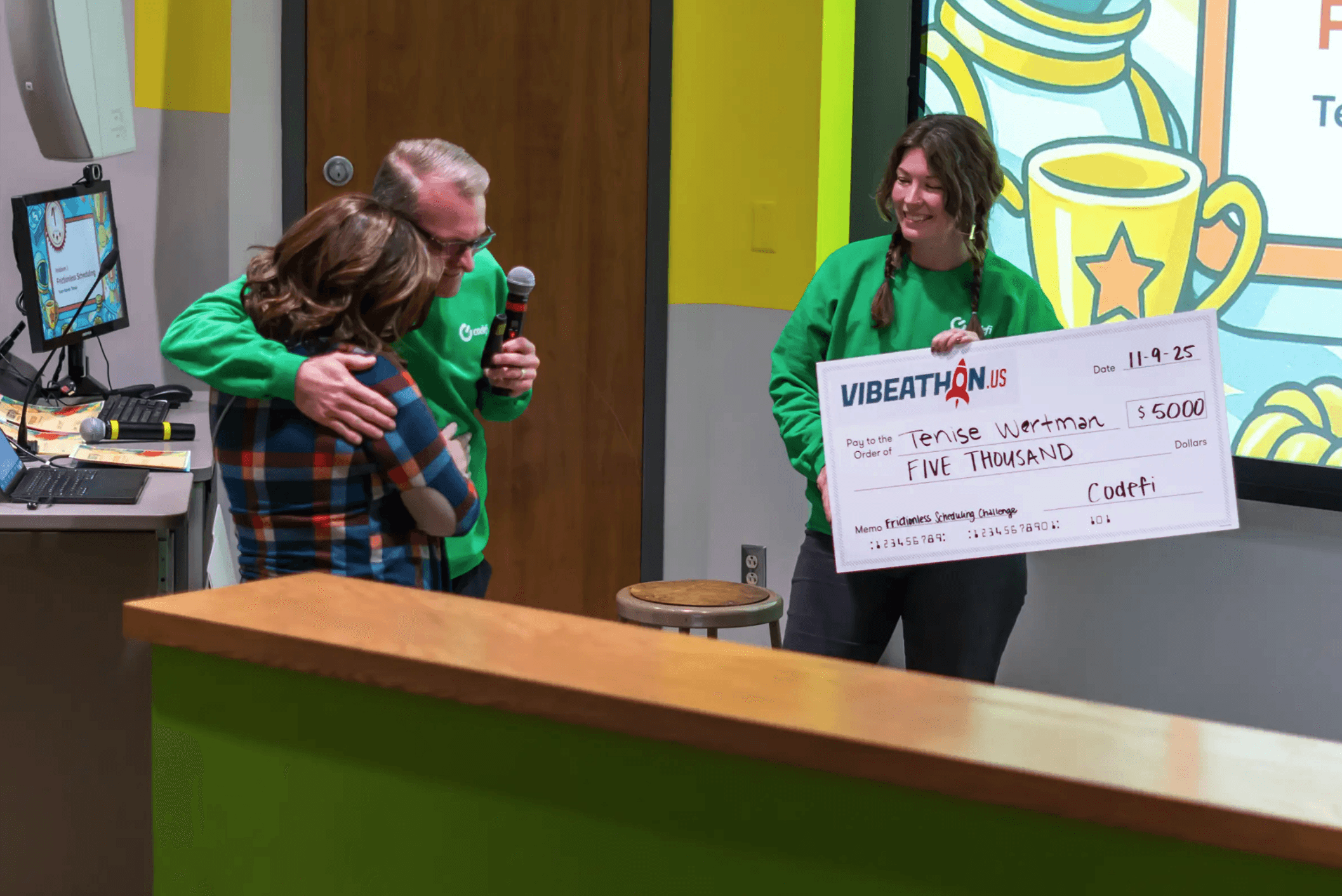
First Prize Winner: A Mother of Nine With No Coding Experience
Tenise Wertman didn't arrive in Joplin with a computer science degree. She arrived with curiosity, grit, and a weekend. A solo competitor from Verona, Tenise had no prior coding experience but ended up winning 1st prize in the Frictionless Scheduling category as well as Best of Show.
What she built over 48 hours: an AI-powered scheduling assistant that matches patient and provider availability, reduces no-shows through intelligent reminders, and improves staff efficiency by eliminating manual coordination. It was functional, thoughtful, and designed with real clinic workflows in mind. The judges awarded her first prize in Frictionless Scheduling and Best of Show—an additional $500 on top of her $5,000 first-place prize.
Her story is the thesis of this entire initiative. The best person to solve a scheduling problem isn't necessarily someone who's built enterprise SaaS systems. It's someone who understands the pain of missed appointments, the chaos of double-bookings, and the cost of wasted time—and now has access to tools that let them build a solution in a weekend instead of waiting for someone else to care.
Other Standout Winners
Jordan Corbett (Springfield, MO) took first place in Financial Navigation with an AI platform that helps patients understand costs upfront and assists providers in reducing billing confusion—a solution that directly addresses why people delay or avoid care.
Team Campfire & Burrow Labs (Springfield, MO), a two-person team, won first prize in Referral & Care Navigation. Their AI-powered referral system enables rapid provider matching, one-click scheduling, and real-time care journey updates—critical capabilities for rural patients navigating fragmented care across multiple providers.
Second and third-place winners came from Cape Girardeau, Springfield, Joplin, and Northwest Arkansas—proof that talent and problem-solving ability exist far beyond the coasts. Teams ranged from solo builders to multi-person collaborations, first-time coders to experienced developers leveling up their AI workflows.
The common thread wasn't prior experience. It was proximity to the problem and access to the right tools.
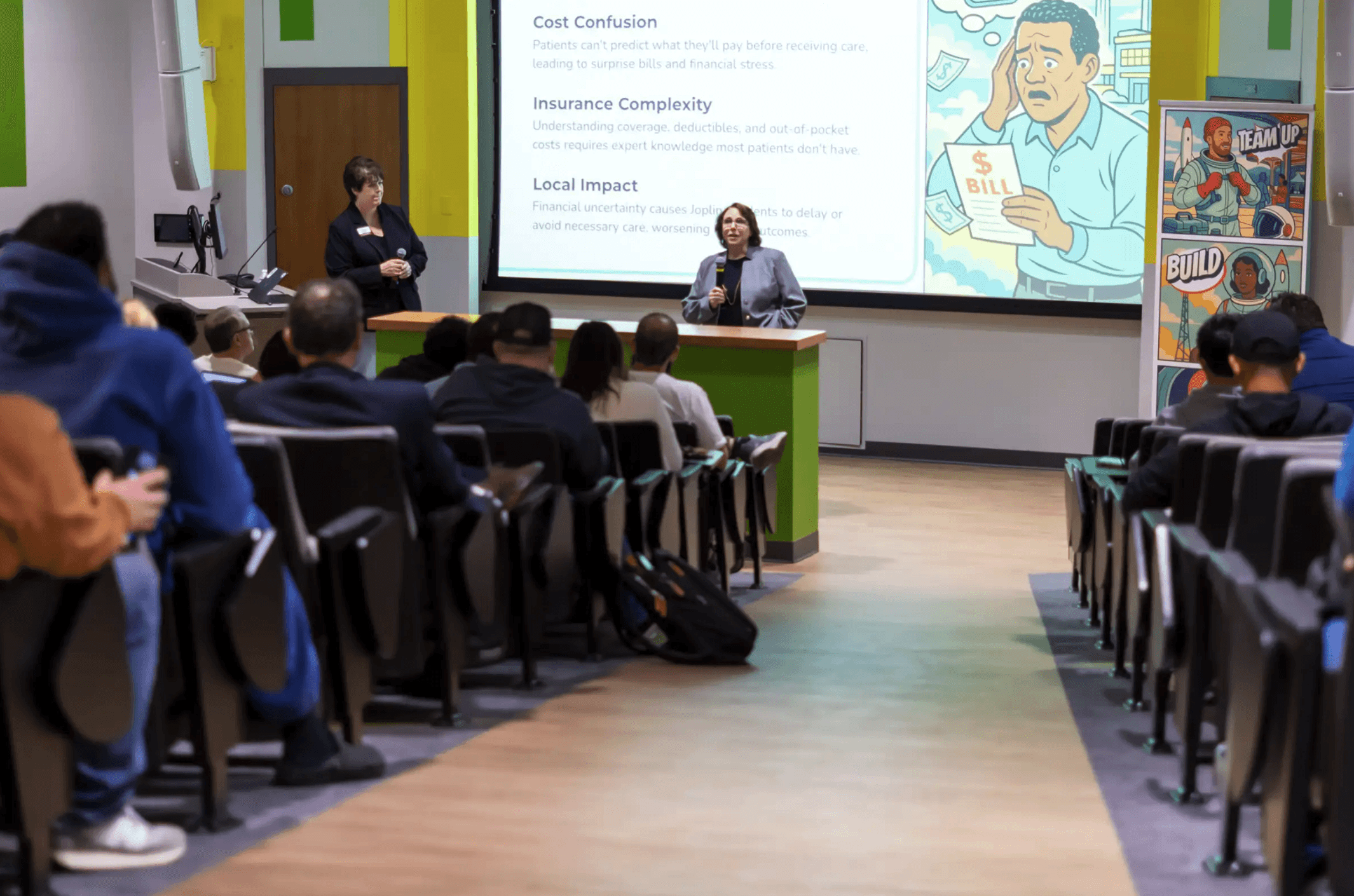
How the codefi and JRAH Partnership Made This Possible
Here's what matters: the problems participants worked on weren't generic. They were sourced through months of structured discovery between codefi and JRAH— interviewing staff, and mapping high-impact pain points across JRAH's healthcare network.
Once we identified their operational pain points through interviews, we used Traction Studio AI, codefi's proprietary startup intelligence platform, to analyze and validate which problems were worth solving. The platform systematically evaluated each healthcare challenge against criteria like market potential, solution feasibility, and path to adoption. Rather than relying on gut instinct about what seemed important, Traction Studio AI helped us assess which pain points had the strongest evidence for real-world viability—filtering dozens of complaints down to three validated challenge areas with clear value propositions and identifiable user bases. By the time participants arrived in Joplin, they weren't just tackling random healthcare frustrations. They were building solutions to problems that had already passed through rigorous opportunity validation, giving every team a head start toward creating something healthcare providers would actually use.
This is the same methodology powering our HealthTech AI Software Startup Studio, a multi-year collaboration designed to systematically identify healthcare delivery problems, validate market opportunities, and build AI-native companies in the region. JRAH opens the doors; codefi leads opportunity validation, MVP development, and team formation.
The Joplin Vibeathon was the first public expression of that partnership in action. JRAH identified where care delivery breaks. Vibeathon participants built working prototypes to fix it. Now, the strongest solutions move into deeper validation—user testing with JRAH's network, iteration cycles with clinical staff, and pathways into pilots and eventually new ventures.
Tenise Wertman's scheduling tool isn't just a prize-winner. It's a candidate for real-world piloting. Same for Jordan Corbett's financial navigation platform and Team Campfire's referral system. This is how grassroots innovation becomes durable economic impact: you start with real problems, empower local builders, and create structured pathways from prototype to product.
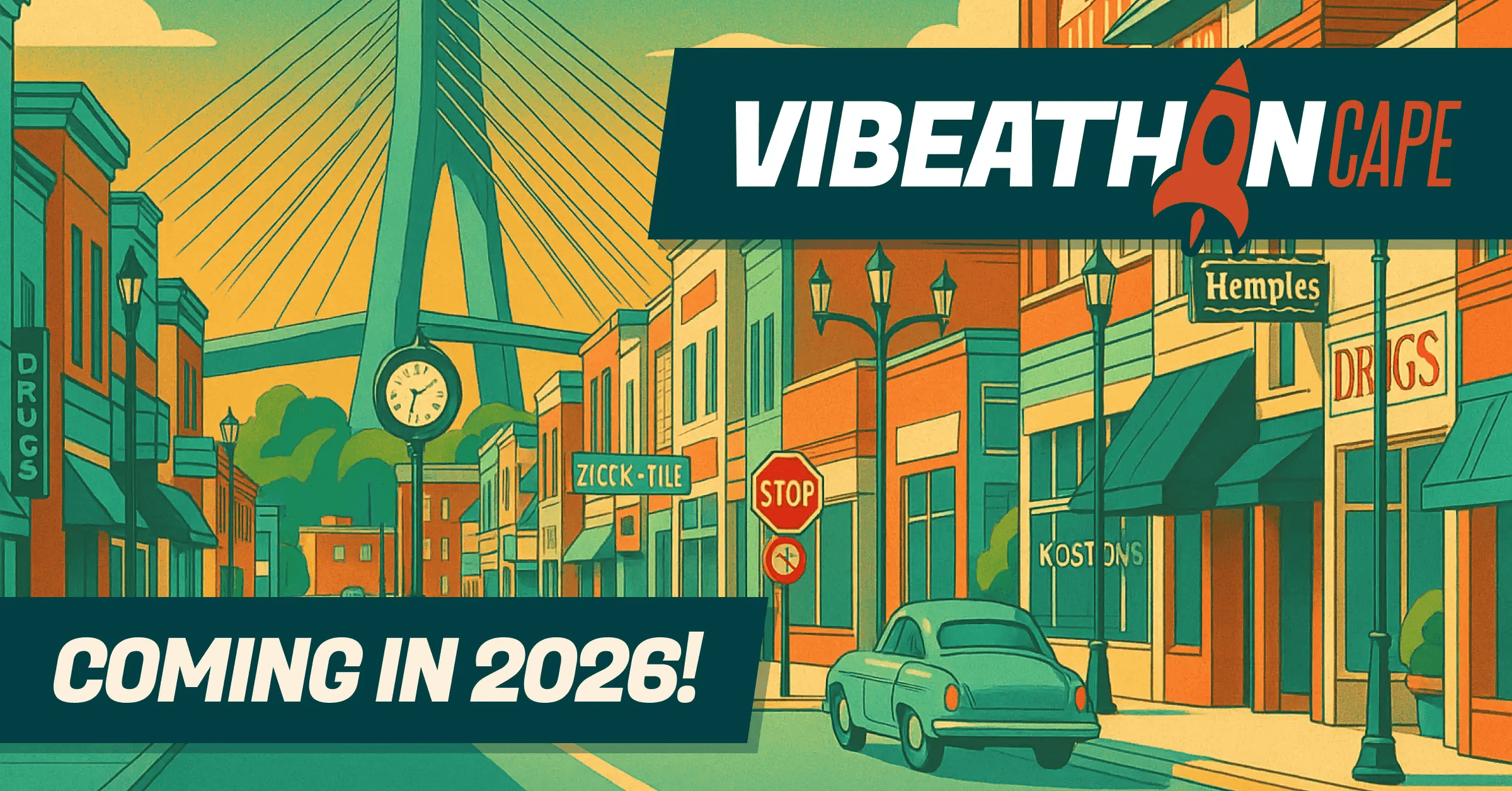
From Joplin to Statewide: The Vibeathon Tour Continues
Joplin was the opening act. We're taking this model across Missouri with Vibeathon events planned for Cape Girardeau, Springfield, St. Joseph, and more cities (dates to be announced soon). Each stop will follow the same playbook: locally sourced problems, expert coaching, AI tools that compress months of work into days, and cash prizes for standout solutions.
Why statewide? Because the best builders don't all live in one zip code, and neither do the problems worth solving. Missouri's advantage is people who understand how work actually gets done—from clinics to classrooms, from shop floors to city offices. By bringing vibe-coding training and community to every region, we eliminate the friction that keeps great ideas trapped in someone's head.
If you're a founder, student, educator, small-business owner, or city staffer with a problem worth solving, this is your on-ramp. Registration details for upcoming cities will be posted at Vibeathon.us as dates are confirmed.
The Bridge to Prompt to Product
A weekend hackathon lights the spark. Some people saw what happened in Joplin and realized they want in—but need structure and time to build confidence. Others participated, tasted what's possible, and are ready to level up their skills and ship something real.
That's why we launched Prompt to Product, a 10-week AI-native training program starting in January 2026. It's designed for founders and career-changers who want to learn how to think like a product builder, use modern AI tools responsibly, and ship something real—not just another portfolio piece.
No coding experience required. Developers welcome—your foundation matters more than ever, but the barriers to entry have collapsed for non-technical builders, too.
By week 10, participants leave with a working AI-enabled product they can show to users, employers, or investors. Then, for those ready to keep going or experienced developers who want to hone their AI skills, there are clear next steps:
Product to Scale mentorship for builders with early traction
AI Masterclass (6 weeks) for experienced developers leveling up
Rapid AI Development (3 weeks) for devs who want a fast workflow sprint
Vibeathon is the pressure test. Prompt to Product is the structured path. Together, they represent the same mission Codefi has held for eleven years: give rural Missourians access to the same opportunities as anyone else, using the sharpest tools available.
Applications for Prompt to Product are now open.
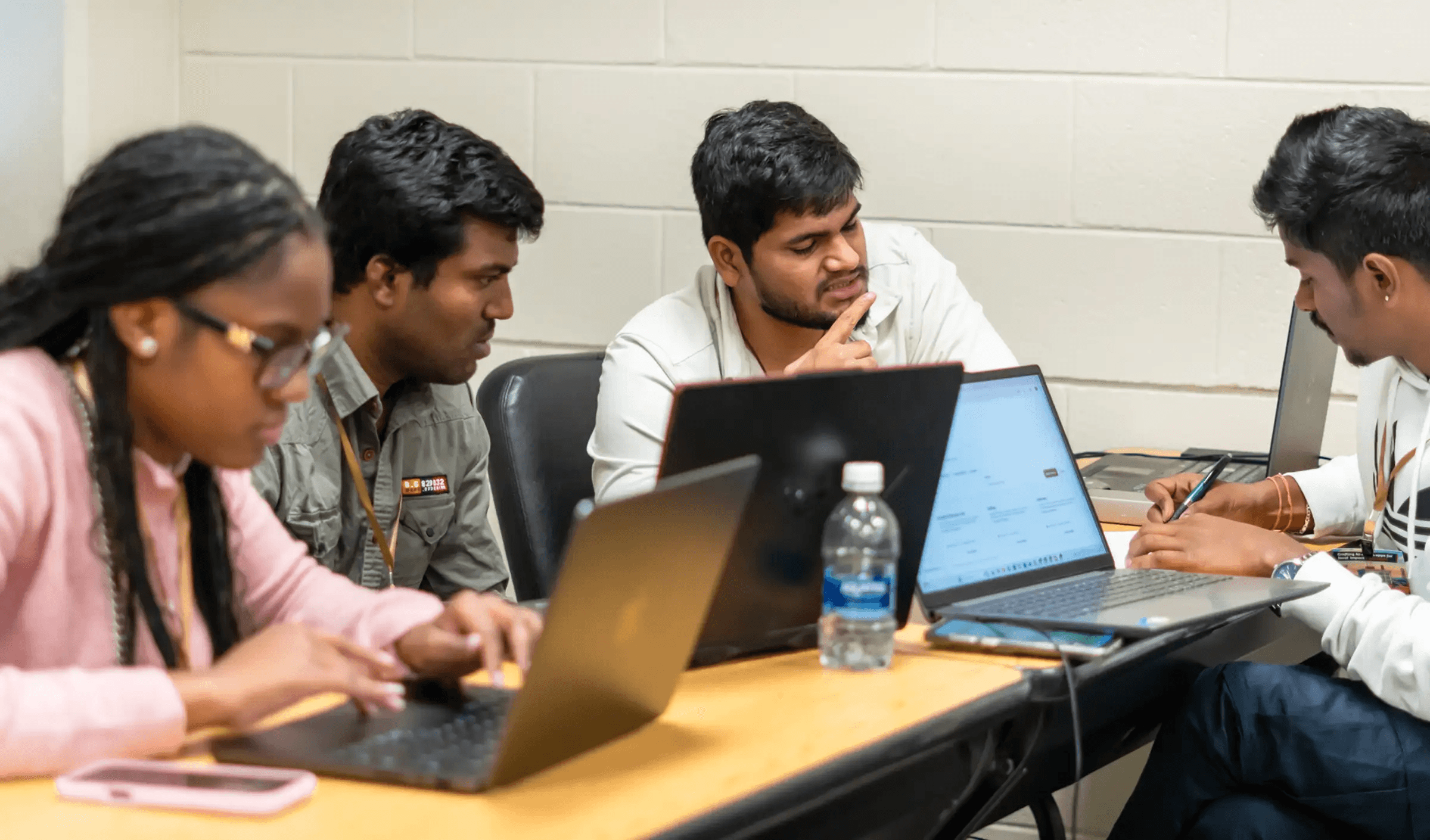
What We Learned in Joplin
Speed changes who gets to build.
When you can go from idea to working demo in a weekend, the playing field levels. What mattered in Joplin wasn't who had the most GitHub repos. It was who understood the problem best and learned the tools fastest.
Context beats credentials.
The people closest to the problem often have the clearest ideas about what would actually help. Give them vibe-coding tools and expert coaching, and they'll build things worth piloting.
Partnerships unlock real problems.
Joplin Healthcare providers didn't hand us theoretical challenges. They gave us the pain points keeping their teams up at night. That specificity made every solution more credible and every demo more compelling.
Rural talent is ready.
Forty-seven people showed up in Joplin on a November weekend—from Verona to Cape Girardeau, from Springfield to Northwest Arkansas—ready to learn and build. The talent exists. The infrastructure to activate it is what we're building.
What's Next? Building Studio Companies That Employ Missourians
We plan to take the work done at the Joplin Vibeathon and begin developing healthcare studio companies that can start solving real problems. These aren't just software projects—they're AI-native technology companies designed to employ people right here in Missouri, drive economic growth in our communities, and skill up our state's workforce. This is what our HealthTech AI Software Startup Studio partnership with JRAH was built for.
Partners Who Made This Happen
The Joplin Vibeathon was made possible by:
Funding Partners
Missouri Technology Corporation
Missouri Department of Higher Education and Workforce Development
Venue Sponsors:
City of Joplin
Joplin Convention & Visitors Bureau
Missouri Southern State University
Break Sponsor:
Nothing Bundt Cakes
Their support removed cost barriers so anyone with a problem and a laptop could participate. That's how you activate talent at scale.
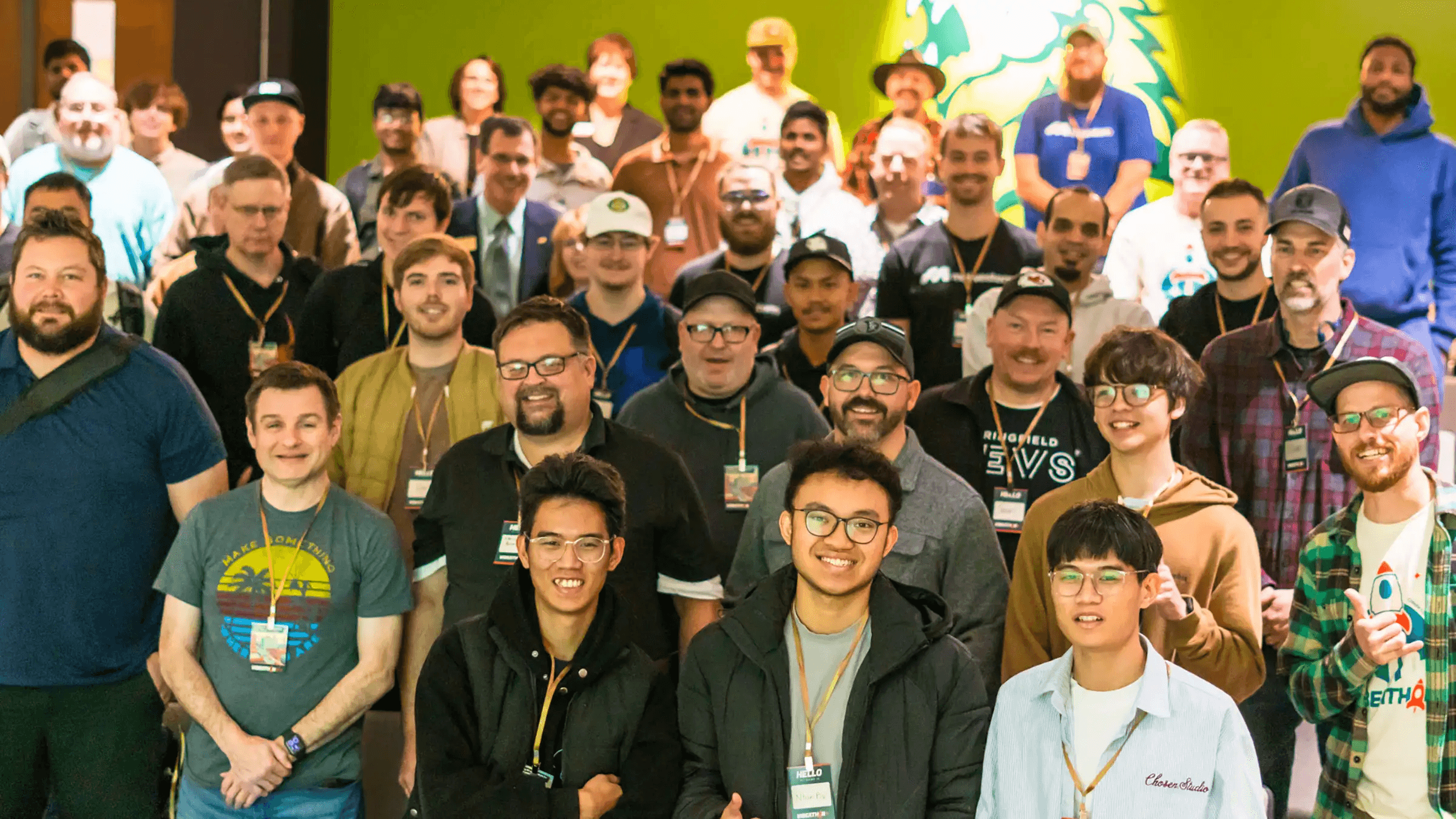
The Bigger Picture
Vibeathons aren't just hackathons with better tools. They're proof that innovation doesn't require venture backing, Bay Area networks, or elite credentials. It requires proximity to real problems, access to modern tools, and a community willing to coach people through the learning curve.
Joplin showed us that a mother of nine from Verona can outbuild teams with engineering degrees. That healthcare providers will show up to help strangers solve their problems. That $20,000 in prizes and two days of focused effort can yield solutions worth piloting in real clinics.
This is what we mean when we say we're building what matters. Not innovation theater. Not demo days with no follow-through. Real tools for real people, built by the communities that need them most, with pathways to turn prototypes into products and products into companies.
From Joplin to Cape Girardeau, from Springfield to St. Joseph, we're bringing this model to every corner of Missouri. If you're ready to build, we're ready to teach you how.
Get Involved
Join an Upcoming Vibeathon
Stay tuned for announcements for upcoming events in Cape Girardeau, Springfield, St. Joseph, and more at Vibeathon.us.
Apply for Prompt to Product Training
Applications are now open for our January 2026 cohort.
Bring a Vibeathon to Your City
Community partners and sponsors, email Charles Elliott for more information.
Codefi is a Missouri-based nonprofit that trains tech talent and supports startups to drive economic impact in rural communities. For eleven years, we've worked to ensure geography never limits opportunity—building the companies, skills, and networks that help Missourians compete and win.
Check out our upcoming Vibeathons Here
